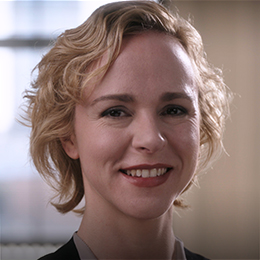Meghan Anzelc
 Why did you choose Northwestern?
Why did you choose Northwestern?
I applied to Northwestern for their PhD in physics program while an undergraduate in physics at Loyola University Chicago. I knew from research internships as an undergrad at Fermilab and Argonne that I wanted to pursue particle physics in graduate school, and Northwestern had professors working at Fermilab.
How would you describe your research and/or work to a non-academic audience? What was it then and/or what it is now?
My PhD research: At the time of the big bang, we think there were equal parts matter and anti-matter. But over time, we know that matter won out since we have a matter-based universe and not an anti-matter universe. In each and every particle interaction in the early universe, matter "won" by an infinitesimally small amount, and there is a theory that explains this slight preference for matter to "win". My dissertation work was measuring a particular particle interaction that helped show that our current theory of this effect was correct, using data from the D-Zero experiment at the Tevatron at Fermilab.
Tell us who or what inspired your research and/or work.
As an undergrad, I found I really enjoyed experimental research. I liked the idea that you could collect data and analyze it and learn something about the world that no one before you had known. During graduate school, I found I wanted to do work that was more applied than basic science research and where I could see the impact of my work in years, rather than in decades. That led me to talk to lots of physicists who had left academia and done all sorts of interesting things in their careers, and resulting in my entering the private sector after graduate school doing data science and analytics in the insurance industry - and now in the human capital industry.
Tell us about a current achievement or something you're working on that excites you.
From my current role, there are a few things. One is learning about a new industry - the executive search (recruiting) industry - and I really enjoy learning new things and figuring out whether what I know from other industries (physics, insurance) also applies here. Second is getting to build an analytics function and team from scratch. There aren't a lot of opportunities to start from the beginning (usually you're coming into an established team) and that's a big and interesting challenge. Third is that there is a ton of opportunity for the work I do to have a real and meaningful impact on the company and its results, which to me is really exciting.
What advice would you give your younger self or someone considering a similar path?
The importance of building and maintaining a network. I had started to build out a network through informational interviews in graduate school, and as I started in the workforce would occasionally have the opportunity to meet someone much more senior. Often, they would offer to stay in touch or answer future questions, and very rarely did I take them up on those offers. I wish I had done a better job of keeping in touch over the years, even on occasion - it’s much harder to reach out to people for help if you haven’t talked to them in a decade. And most people genuinely want to help - I was somewhat intimidated when senior people offered and was afraid to reach out. I wish I hadn’t been afraid or had done it anyway.
I negotiated (successfully!) my first job offer, but at the time didn’t appreciate that I would really have to push and fight for raises, promotions, and job offer compensation at every step of my career. In some ways that’s disheartening, but I think if I had known I might have been better prepared mentally - or better yet, would have taken a negotiation course in college or graduate school and had better negotiation skills earlier!
When I started looking for jobs as I neared the end of my PhD, I did not try to learn other programming languages, domain knowledge (e.g. insurance terminology), or other technical skills. However, I did work quite a bit on describing the skills I had in plain English without using jargon, and spent a lot of time learning what kinds of skills companies were interested in and how they described what they wanted in a candidate. I encourage anyone interested in moving out of academia and into the private sector to spend time on this as I found it helped quite a bit and started getting more interviews as I improved.